They gather up cans and bottles on NY streets for recycling. And they could use a raise
For 40 years, New York’s Bottle Bill has lived up to its promise.
By placing a nickel bounty on containers of beer, soda and water, it’s kept litter off streets and roadsides and encouraged recycling programs that have prevented billions of containers from ending up in landfills.
At 64%, the state’s redemption rate is nearly three times what it is in states that don't have the nickel incentive. And each year, it puts more than $100 million into New York’s budget.
All those blue bins have made a difference.
So has Josefa Marin.
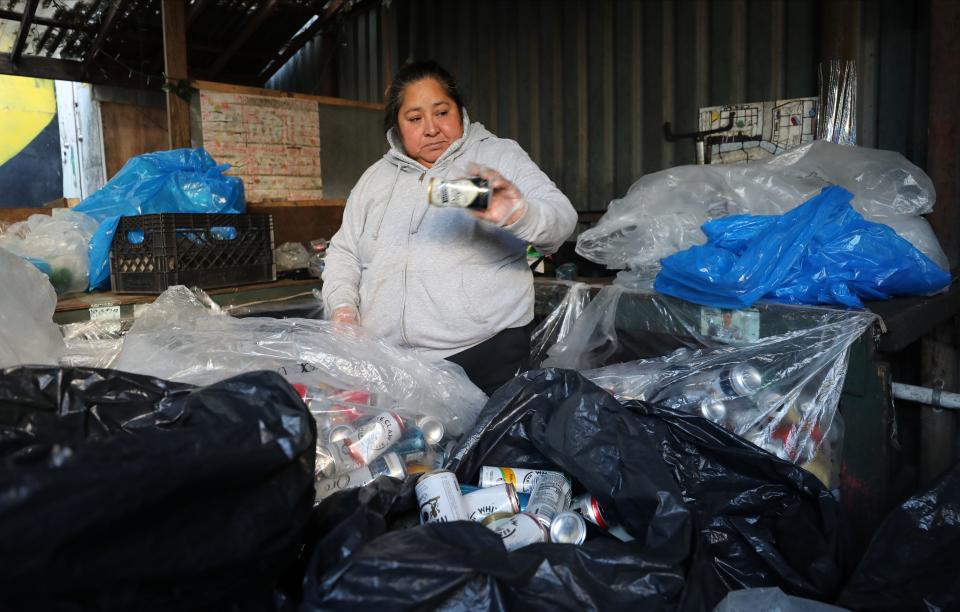
For 15 years, the Mexican émigré has made a living gathering up bottles and cans and redeeming them for the nickel deposit they fetch at Sure We Can, the Bushwick, Brooklyn recycling center near her home.
She sees herself as an essential part of New York’s environmental workforce, a soldier in a green army of thousands who fan out across the state each day scratching out a meager living gathering up cans and bottles someone else threw away.
“We know we’re doing good work,” Marin said. “There’s lots and lots of people out there recycling and we’re the ones keeping litter off the streets and keeping the city clean.”
But inflation and rising costs of living have made it harder for canners like Marin to survive on all those nickels. And a new generation of canners pushed into the work by the pandemic, as well as recent migrants, has created even more competition.
Marin, 63, could use a raise.
“They’re always saying it’s gonna go higher, it’s going to happen but it doesn’t happen,” Marin said one morning in November inside a trailer that serves as Sure We Can’s office space, while the clatter of cans and bottles being sorted filled the air.
Town: How an upstate town famous for a Christmas classic film became NY's dumping ground
Overhaul of NY's Bottle Bill on horizon?
Marin joins a growing number of canners who've been pushing state lawmakers to double the nickel deposit for cans and bottles, which would mark the first increase since the bill went into effect in 1983.
It would be just one piece of a proposed overhaul of the Bottle Bill that state lawmakers are weighing ahead of next year's legislative session.
Another would expand the types of containers eligible for redemption to wine and liquor bottles as well as non-carbonated beverages.
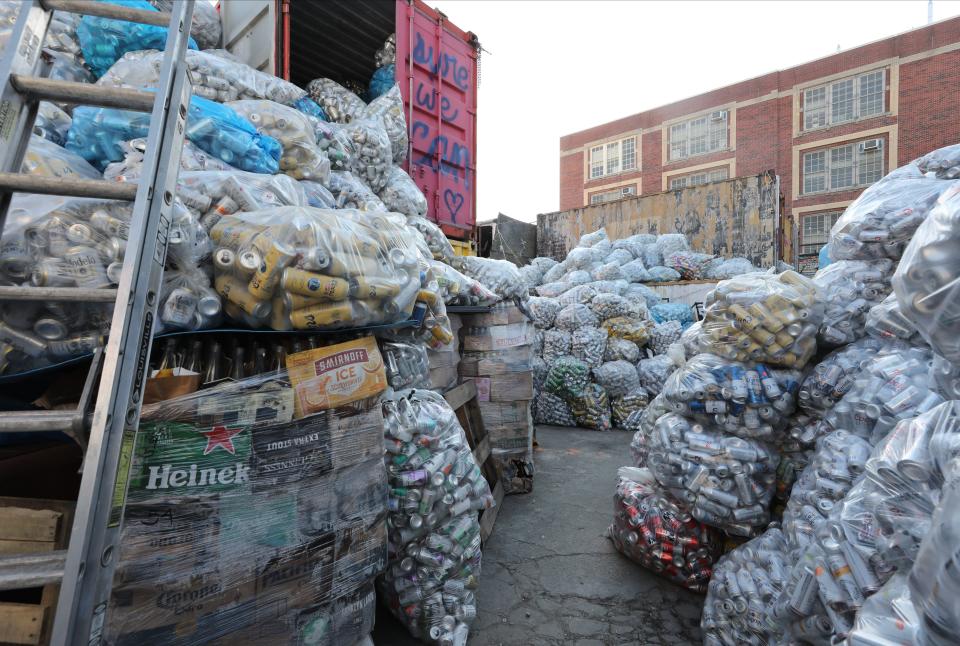
And redemption centers like Sure We Can want the state to allow them to take more than the 3.5 cents they receive now for redeeming a container. One proposal would increase the per-container rate to 6 cents. The last increase, from two cents, was in 2009.
The idea has the support of the New York Public Interest Research Group, which says redemption centers that canners rely on have shut down in recent years amid rising costs for wages, rent and other expenses.
NYPIRG executive director Blair Horner says an increase is long overdue and makes sense not only for canners and redemption centers but for the state economy. Between 2011 and 2021, the state took in $1.2 billion in unclaimed deposits.
“You enhance recycling, you reduce litter, you generate revenue for the state and you help these businesses and canners all at the same time,” Horner said.
But the idea is getting pushback on several fronts.
Recycling: NY's recycling programs down in the dumps while more trash heads to landfills
Pushback over potential costs, increased bottle volume
Stores don’t want the added cost that comes with a likely increase in volume as more customers come back to collect their dime deposit. Some will need to purchase and install reverse vending machines.
The owners of wineries and liquor stores, whose products would be included under an expanded bill, express similar concerns.
And recycling haulers say a 10-cent deposit would remove valuable recyclables from their waste stream by diverting the containers to redemption centers and stores.
They say the current system works just fine.
“Why are we creating different systems to take stuff out of the blue box and send them back to the store?” said Ken Pokalsky, the vice president of The Business Council of New York.
And, Pokalsky says, the state is already weighing “expanded producer responsibility” legislation which would create extra costs for companies by requiring them to package their products with recyclable material that lessens the impact on landfills.
It pays for her soda
When she arrived in New York, Marin spotted canners going through garbage receptacles and plucking out bottles and cans. Many appeared to be using the money to buy alcoholic beverages, which got her thinking.
“Well, if they can do it for their alcohol, why can’t I do it for my soda,” she said.
Soon she was making enough to pay for her meals.
On her very best days — say after a concert in the park — she’s made as much as $300.
But that’s rare. Most days she can make between $10 and $30.
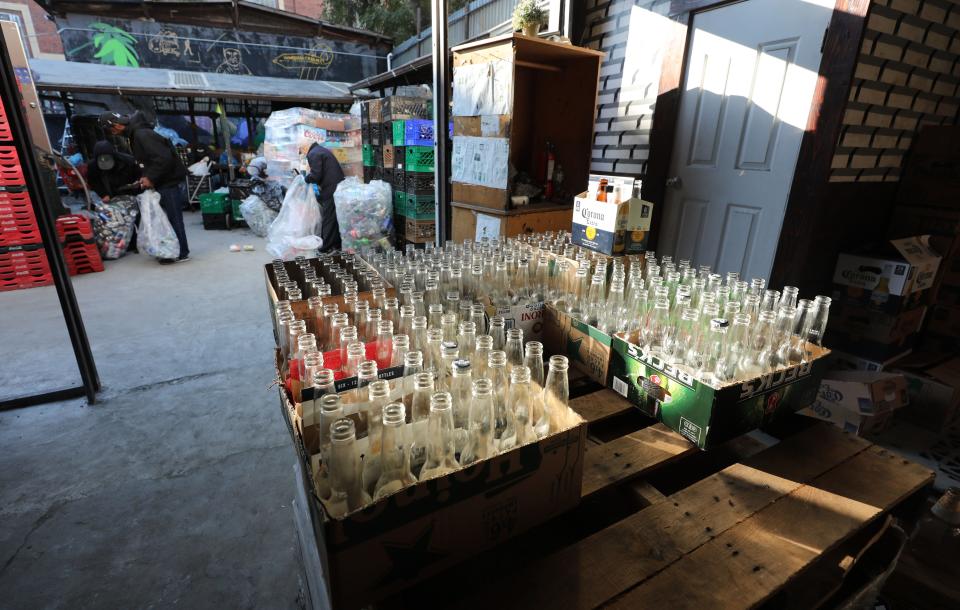
She relies on an informal network of business owners, building superintendents and others who save the containers for her to retrieve them. “It all depends on how much I can find and bring in,” she said.
A few years ago, she and others started the Alliance for Independent Recyclers, an informal union of canners who work in the five boroughs.
“We wanted to organize to strengthen our voice so that we would be listened to by the institutions and also to build up a sense of mutual support,” she said.
On a Thursday morning in November, canners rumble into Sure We Can pushing shopping carts filled with plastic bags stuffed with cans. They sort the cans by product name — Coors, Pacifico, Modelo — while music plays from a Spanish language station.
Last year, about 1,000 canners came through Sure We Can’s space on McKibbin Street in a mostly residential neighborhood that bumps up against aging industrial sites. Ryan Castalia, its executive director, expects the numbers to be even higher this year.
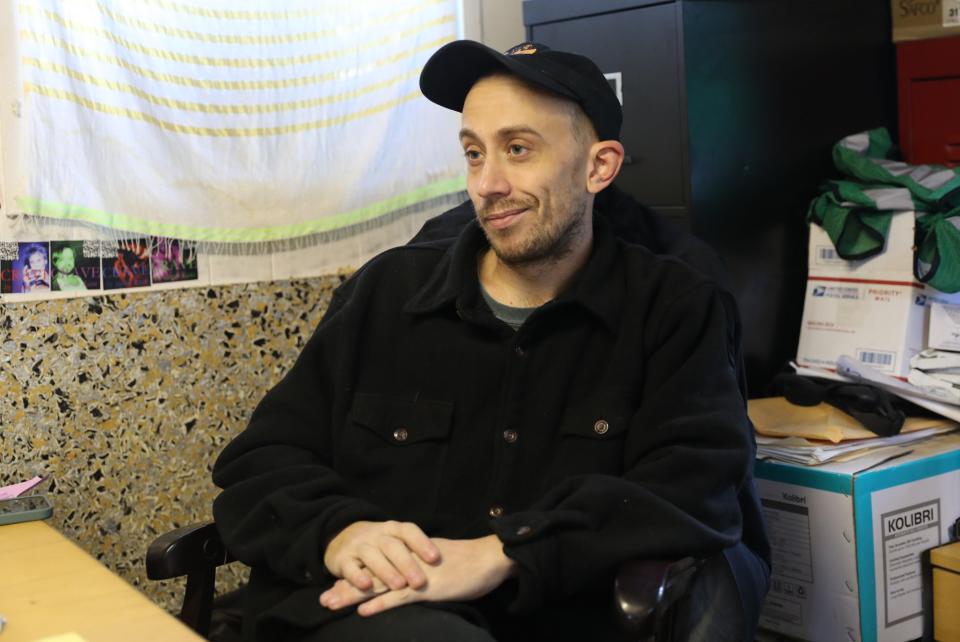
Roughly 60 to 100 come in at least once a week. They receive the nickel deposit plus another penny to a penny and a half if they do their own sorting.
It’s the only non-profit redemption center in the city and one of the few in the U.S. The city uses its own recycling center to take in containers collected through curbside recycling programs.
Castalia discovered Sure We Can several years ago when he came to perform in Bushwick with his theater troupe. Later, when he found himself out of work, he took a job sorting cans, making $20 a day.
He supports the canners' push for a raise.
“Because the deposit isn’t a significant enough incentive for the average person to return their material, it’s created this whole sector of workers who recognize the value and pursue it by collecting the bottles and cans other people throw away,” Castalia said. “Yet the value hasn’t changed for 40 years, so these essential workers who are doing this amazing work cleaning up the litter from our streets haven’t had a raise for four decades.”
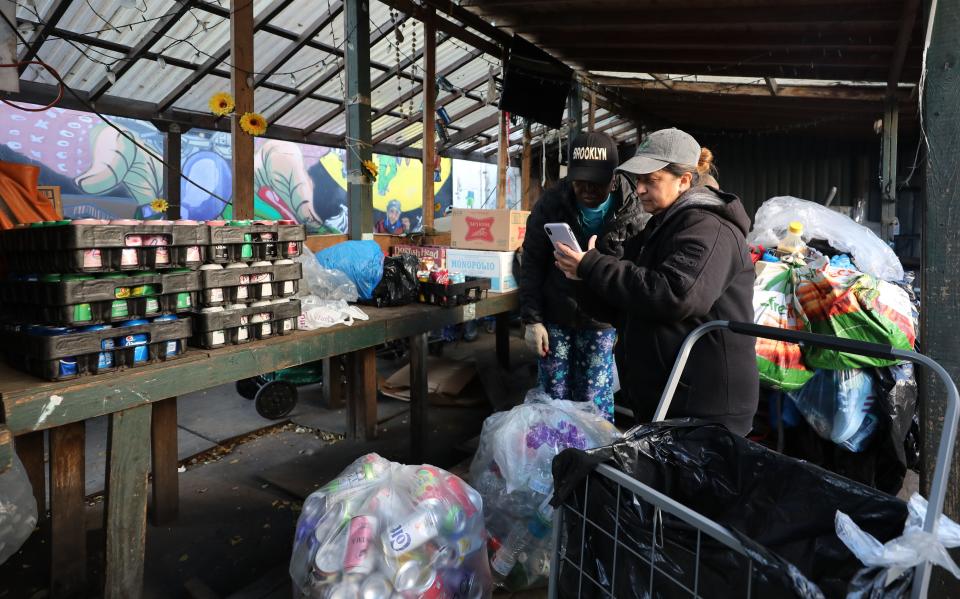
'Every canner is a hard worker'
At a hearing held in Albany in November, Castalia joined other redemption center operators in calling for the state to follow Maine’s lead and increase the per-container rate.
Several centers have shut down in recent years. Among them is Jan’s Cans in Fort Edward run by Jan Skelley. It closed in April.
At its height, the business had five employees. This year it was down to two, including Skelley.
Last year, working three days a week, the business took in 3.3 million containers, many of them brought in by school groups and athletic teams who used the redemption money as a fundraising tool, she says.
She urged state lawmakers to help when she realized hers and others' businesses wouldn’t be able to continue at the 3.5 cents per container rate.
“When it comes to us small, local mom-and-pop businesses who give much-needed work to the community, they don’t give two hoots about us,” she said.
The centers fill a need store-based redemption can’t by taking in all brands, rather than only those that a store sells. And there are no limits on the amount that can be redeemed at one time.
Without them, many of the canners wouldn’t have a place to redeem their cans and bottles and the state would lose an essential service, Castalia says.
“Josefa and other individuals, I’ve seen them bridle at the categorization of canners as this indigent group of people who suffer some unresolvable malady in their lifestyle that they’re resigned to this type of work, when that’s just really not the case,” Castalia said. “Every canner is a hard worker, not an unmentionable.”
This article originally appeared on Rockland/Westchester Journal News: NY recyclers of cans, bottles pushing for a raise. Here's why

